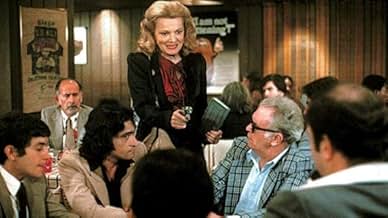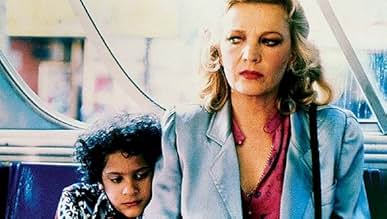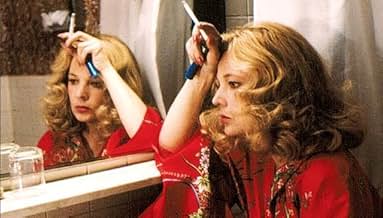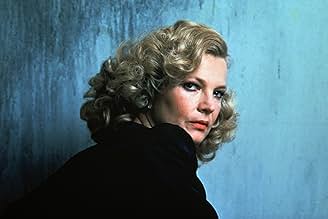NOTE IMDb
7,1/10
13 k
MA NOTE
Quand la famille d'un jeune garçon est tuée par la mafia, la voisine Gloria devient sa tutrice à contre coeur. En possession d'un livre que les gangsters veulent, ils partent tous les deux e... Tout lireQuand la famille d'un jeune garçon est tuée par la mafia, la voisine Gloria devient sa tutrice à contre coeur. En possession d'un livre que les gangsters veulent, ils partent tous les deux en cavale à New York.Quand la famille d'un jeune garçon est tuée par la mafia, la voisine Gloria devient sa tutrice à contre coeur. En possession d'un livre que les gangsters veulent, ils partent tous les deux en cavale à New York.
- Réalisation
- Scénario
- Casting principal
- Nommé pour 1 Oscar
- 4 victoires et 5 nominations au total
Gary Howard Klar
- Irish Cop
- (as Gary Klar)
Avis à la une
10katgyrl
As the title character in 'Gloria' Gena Rowlands gives a subtle yet powerful performance which gives this John Cassavettes film its soul and its focal point.
On the advent of Sharon Stone's re-characterization of 'Gloria' in the 1999 Sidney Lumet re-make it bares mentioning that while Ms. Stone is wonderfully talented the passionate yet understated performance that Gena Rowlands gives in the original can't & won't be topped.
As a woman confronted with a life or death decision, to save her own or that of a child orphaned by the mafia, Ms. Rowlands brings us a character that we can all relate to, a woman caught at the crossroads of her life.
If you've ever had to make any sort of 'Should I stay or should I go' life changing desicion and you're thinking of seeing the current re-make I encourage you to rent the original as well, you won't be disappointed!
On the advent of Sharon Stone's re-characterization of 'Gloria' in the 1999 Sidney Lumet re-make it bares mentioning that while Ms. Stone is wonderfully talented the passionate yet understated performance that Gena Rowlands gives in the original can't & won't be topped.
As a woman confronted with a life or death decision, to save her own or that of a child orphaned by the mafia, Ms. Rowlands brings us a character that we can all relate to, a woman caught at the crossroads of her life.
If you've ever had to make any sort of 'Should I stay or should I go' life changing desicion and you're thinking of seeing the current re-make I encourage you to rent the original as well, you won't be disappointed!
You start with flinty, streetsmart gangster types, cross their paths with a little kid, put them in urban peril, and then you squeeze how things stack up for sentimentality, suspense and humor. It's a charming idea, and perhaps that's why this could be considered John Cassavetes's most conventional film. It tells the story of a gangster's girlfriend who goes on the run with a young boy who is being pursued by the mob for information he doesn't even know he might have. But he wants to tell the story his own way, obstructing every convention we would normally expect, instilling a realist perspective in how we follow the movie, making the pay-off that much more worthwhile. Cassavetes didn't intend to direct his script. He just wanted to sell the story to Columbia Pictures. But once his wife Gena Rowlands was asked to play Gloria, she obliged Cassavetes to direct it.
This underdog crime drama is particularly absorbing in its first hour, and ignites with a great beginning. We follow one character, it leads to another character, perspectives are interknit, the situation builds and Cassavetes has complete control over what we know and expect, all in spite of the all-too-familiar premise, which is then set for the rest of the movie, which is a cat-and-mouse hunt per the seedier locales of New York and New Jersey. He makes the threat so real that when the two key characters evade tangible danger, we still feel the tension whenever they round a corner, get in and out of cabs, and other such ordinary actions. He doesn't let on that unwanted company is present. It just happens. There is one scene that lasts for quite awhile before we realize, after Rowlands's title character does, that unwanted company has been there the entire time.
In an Oscar-nominated performance, Rowlands is expectedly the beautiful lead actress, but she sports a kind of masculine quality, creating a much more dense dynamic when she, afraid of her maternal instincts, finds them overpowering her lifelong self-preservation, and begrudgingly protects the boy. As the film progresses, however, she becomes more sincere in her protection, and integrates her love with her seasoned familiarity with how to stay alive in this town. In one creative take on the Fine, I Don't Need You Anyway scene, she asks a bartender, "There's reasons I can't turn and just look, but is there a little kid headed in here or across the street or whatever?" She drives her role with such honest irritable liveliness. Yet the kid is also well cast. He was a conspicuous little boy named John Adames with dark hair, big eyes and a way of trucking his dialogue as if confronting you to adjust a single word. It all works because everything about his character, the way he dresses, talks, revolts and moves, serves the naive notion that he is older, smarter and cooler than he is.
Cassavetes has a natural keenness for guilelessly unadorned location shooting in that he never plans, stages, waits on the weather or time of day, or hires extras or stunt drivers. Note how passers-by in the distance will often look on at the characters, whether Gloria has pulled a gun in a public place or not. Wherever the characters need to be, that place is in real time, as dirty, scuzzy and purely of the film's era as it would've normally been. There's a shabby flophouse where the clerk tells Gloria, "Just pick a room. They're all open." There are bus stations, back alleys, dimly lit hallways, and bars that open at dawn. And his occasional action scenes are so thrilling because of their surprise.
For once, Cassavetes doesn't stage indefinitely extensive scenes of dialogue wherein the actors indulge in their own view of their characters' unraveling. But I miss that. As I've already said, I am very impressed with how tightly he mounts suspense from the very beginning, how Gloria and the kid zip from cab to bus to cab to street to hotel to cab and so on. But regardless of how doggedly realistic he is in his portrayal of a recycled movie plot, he still relies upon that plot rather than the impositions of his characters flexing their wings.
This underdog crime drama is particularly absorbing in its first hour, and ignites with a great beginning. We follow one character, it leads to another character, perspectives are interknit, the situation builds and Cassavetes has complete control over what we know and expect, all in spite of the all-too-familiar premise, which is then set for the rest of the movie, which is a cat-and-mouse hunt per the seedier locales of New York and New Jersey. He makes the threat so real that when the two key characters evade tangible danger, we still feel the tension whenever they round a corner, get in and out of cabs, and other such ordinary actions. He doesn't let on that unwanted company is present. It just happens. There is one scene that lasts for quite awhile before we realize, after Rowlands's title character does, that unwanted company has been there the entire time.
In an Oscar-nominated performance, Rowlands is expectedly the beautiful lead actress, but she sports a kind of masculine quality, creating a much more dense dynamic when she, afraid of her maternal instincts, finds them overpowering her lifelong self-preservation, and begrudgingly protects the boy. As the film progresses, however, she becomes more sincere in her protection, and integrates her love with her seasoned familiarity with how to stay alive in this town. In one creative take on the Fine, I Don't Need You Anyway scene, she asks a bartender, "There's reasons I can't turn and just look, but is there a little kid headed in here or across the street or whatever?" She drives her role with such honest irritable liveliness. Yet the kid is also well cast. He was a conspicuous little boy named John Adames with dark hair, big eyes and a way of trucking his dialogue as if confronting you to adjust a single word. It all works because everything about his character, the way he dresses, talks, revolts and moves, serves the naive notion that he is older, smarter and cooler than he is.
Cassavetes has a natural keenness for guilelessly unadorned location shooting in that he never plans, stages, waits on the weather or time of day, or hires extras or stunt drivers. Note how passers-by in the distance will often look on at the characters, whether Gloria has pulled a gun in a public place or not. Wherever the characters need to be, that place is in real time, as dirty, scuzzy and purely of the film's era as it would've normally been. There's a shabby flophouse where the clerk tells Gloria, "Just pick a room. They're all open." There are bus stations, back alleys, dimly lit hallways, and bars that open at dawn. And his occasional action scenes are so thrilling because of their surprise.
For once, Cassavetes doesn't stage indefinitely extensive scenes of dialogue wherein the actors indulge in their own view of their characters' unraveling. But I miss that. As I've already said, I am very impressed with how tightly he mounts suspense from the very beginning, how Gloria and the kid zip from cab to bus to cab to street to hotel to cab and so on. But regardless of how doggedly realistic he is in his portrayal of a recycled movie plot, he still relies upon that plot rather than the impositions of his characters flexing their wings.
A genre-bending odyssey, full of dank, dark alleys, filthy side streets, buses, taxi cabs, trains and subways, John Cassavetes' film "Gloria" is perhaps the most impersonal of his personal work, which surely inspired Luc Besson's 1994 action-packed "Leon," the film explores the development of the mother-son bond under extreme circumstances.
One of Gena Rowland's most underrated performances, Gloria stands shoulder to shoulder with other iconic heroines of American cinema; such as Dietrich's Shanghai Lily and Uma Thurman's Beatrix Kiddo.
Cassavetes explores new narrative possibilities unlike any other of his contemporaries. Though there always seems to be a surplus of emotion, dialogue or trivialities in his work - and I'm not the first to make such an observation - Cassavetes maintains his focus, which is of course, to show us a slice of life, however extreme or crazy it may appear to an audience.
One of Gena Rowland's most underrated performances, Gloria stands shoulder to shoulder with other iconic heroines of American cinema; such as Dietrich's Shanghai Lily and Uma Thurman's Beatrix Kiddo.
Cassavetes explores new narrative possibilities unlike any other of his contemporaries. Though there always seems to be a surplus of emotion, dialogue or trivialities in his work - and I'm not the first to make such an observation - Cassavetes maintains his focus, which is of course, to show us a slice of life, however extreme or crazy it may appear to an audience.
Good movies are timeless. Or they feel so. Sometimes this is because their subject is universal and it does not really matter what epoch the action is set in. In some other cases the quality of the story and of the acting make the period irrelevant. A good example is 'Gloria', a film made in 1980 by director (and actor) John Cassavetes about whom I knew very little before seeing this film. And yet, 'Gloria' is a gangster movies that keeps the interest of viewers all over the two hours of screen time and looks new and fresh, despite having been filmed almost 40 years ago.
The subject of the film will look familiar, as later movies like Luc Besson's 'Léon' have dealt with the theme of gangsters involved folks meeting and befriending kids, and melting to humanity in the course of the story. 'Gloria' however included from start a big twist. The lead adult hero is a woman, the ex-girlfriend of one of the mob chiefs, who witnesses the murder of the family of a six years old kid (her neighbor) who has nobody left to care about him and no place to go. Taking him under her protection means placing her in conflict with the mob (as the kid holds an accounting book with compromising mafia secrets) and with the law (she is believed to have kidnapped the kid). What follows is a few days of running from everybody and fighting for survival in the New York of 1980.
The New York in the film is a city that looks so familiar: the streets (much dirtier and more dangerous), the buildings (combining modern and decrepit), the skyline (with the painful silhouettes of the twin towers), the people who look so much the same as the diverse human landscape of the big city we know. The only major thing that seems to have changed is the value of the dollar. It may be as difficult as 40 years ago to change a 100 dollars bill, but two dollars fifty cents would not be sufficient nowadays for any room in a city hotel, probably not even for a tip in any city hotel. The other ingredient that makes the film interesting is the excellent acting performance of Gena Rowlands who partners with the young John Adames, a kid actor who did not grow into an adult actor. She is vulnerable as a woman who does not like kids (her cat is collateral damage in the first minutes of the film) and has a troubled past, yet strong as she knows the language and manners of the crime world and how to survive it. The ending is a little disappointing, unexpectedly conventional for such a film that is so non-conventional from many points of view, but this does not spoil too much the good impression left by this fresh classic.
The subject of the film will look familiar, as later movies like Luc Besson's 'Léon' have dealt with the theme of gangsters involved folks meeting and befriending kids, and melting to humanity in the course of the story. 'Gloria' however included from start a big twist. The lead adult hero is a woman, the ex-girlfriend of one of the mob chiefs, who witnesses the murder of the family of a six years old kid (her neighbor) who has nobody left to care about him and no place to go. Taking him under her protection means placing her in conflict with the mob (as the kid holds an accounting book with compromising mafia secrets) and with the law (she is believed to have kidnapped the kid). What follows is a few days of running from everybody and fighting for survival in the New York of 1980.
The New York in the film is a city that looks so familiar: the streets (much dirtier and more dangerous), the buildings (combining modern and decrepit), the skyline (with the painful silhouettes of the twin towers), the people who look so much the same as the diverse human landscape of the big city we know. The only major thing that seems to have changed is the value of the dollar. It may be as difficult as 40 years ago to change a 100 dollars bill, but two dollars fifty cents would not be sufficient nowadays for any room in a city hotel, probably not even for a tip in any city hotel. The other ingredient that makes the film interesting is the excellent acting performance of Gena Rowlands who partners with the young John Adames, a kid actor who did not grow into an adult actor. She is vulnerable as a woman who does not like kids (her cat is collateral damage in the first minutes of the film) and has a troubled past, yet strong as she knows the language and manners of the crime world and how to survive it. The ending is a little disappointing, unexpectedly conventional for such a film that is so non-conventional from many points of view, but this does not spoil too much the good impression left by this fresh classic.
I have not seen the remake of GLORIA yet, and needless to say, I'm not looking forward to it. Not to say that Sharon Stone can't play a tough female, who's self-imposed as a bodyguard for a kid running from mobsters. It is just that Gena Rowlands is so much more versatile, and her range so much wider, and I just KNOW that Stone won't be able to cut it. So, I will stop speculating, and get to the facts.
GLORIA is a film that Cassavete's made as an antidote to brainless, violent action films. All of the violence has dramatic purpose, and nothing is pointless here. This may be off-putting to fans of the action genre, but Cassavetes' contempt for the genre is what makes GLORIA more interesting. There are several unexpected twists.
When the film begins, Gloria is a street-smart woman who is kind of "married" to the mob. Gloria has a tomboyish quality that lends credibility to the fact that she has lived this long. She looks out for herself, first and foremost.
This changes when a weasel, and friend,of Gloria's (Buck Henry) is murdered by her mobster friends. Henry and his wife are killed, leaving behind a scared child. The little boy is a witness to the murder, and the mobsters make chase.
Gloria feels her maternal instincts begin to take over, and begrudgingly protects the boy. As the film progresses, however, she becomes more sincere in her protection, and she draws the line further for the mobsters. She has survived in the harsh city for this long, so it is easy to assume that she knows how to stay alive.
GLORIA is by no means Cassavete best film. There are long stretches that test your patience, that can sometimes seem static. But, as much as I dislike this quality, I am familiar with several Cassavetes' films, and understand what he is trying to achieve. Cassavetes is a very emotional director. He doesn't focus on tragedy; he is more interested in survival and the baggage that that brings. GLORIA is a thinking-person's thriller, and if you prefer big explosions and high body-counts, go and see DIE HARD 2 again. But, if you want to see something different, check this one out.
GLORIA is a film that Cassavete's made as an antidote to brainless, violent action films. All of the violence has dramatic purpose, and nothing is pointless here. This may be off-putting to fans of the action genre, but Cassavetes' contempt for the genre is what makes GLORIA more interesting. There are several unexpected twists.
When the film begins, Gloria is a street-smart woman who is kind of "married" to the mob. Gloria has a tomboyish quality that lends credibility to the fact that she has lived this long. She looks out for herself, first and foremost.
This changes when a weasel, and friend,of Gloria's (Buck Henry) is murdered by her mobster friends. Henry and his wife are killed, leaving behind a scared child. The little boy is a witness to the murder, and the mobsters make chase.
Gloria feels her maternal instincts begin to take over, and begrudgingly protects the boy. As the film progresses, however, she becomes more sincere in her protection, and she draws the line further for the mobsters. She has survived in the harsh city for this long, so it is easy to assume that she knows how to stay alive.
GLORIA is by no means Cassavete best film. There are long stretches that test your patience, that can sometimes seem static. But, as much as I dislike this quality, I am familiar with several Cassavetes' films, and understand what he is trying to achieve. Cassavetes is a very emotional director. He doesn't focus on tragedy; he is more interested in survival and the baggage that that brings. GLORIA is a thinking-person's thriller, and if you prefer big explosions and high body-counts, go and see DIE HARD 2 again. But, if you want to see something different, check this one out.
Le saviez-vous
- AnecdotesActress Gena Rowlands once said of her ex-gun moll character: "When I read the script, I knew I wanted a walk for her. I wanted something that, from the minute you saw me, you knew I could handle myself on the streets of New York. So I started thinking about when I lived in New York, how different I walked down the street when there was nobody but me. It was a walk that said, they'd better watch out."
- GaffesWhen Phil boards the train, the shot has been reversed, as evidenced by backwards lettering on the signs on the train and the platform.
Meilleurs choix
Connectez-vous pour évaluer et suivre la liste de favoris afin de recevoir des recommandations personnalisées
- How long is Gloria?Alimenté par Alexa
Détails
- Date de sortie
- Pays d’origine
- Sites officiels
- Langues
- Aussi connu sous le nom de
- One Summer Night
- Lieux de tournage
- Trinity Church Cemetery - 770 Riverside Drive, Manhattan, Ville de New York, New York, États-Unis(ending scene at Pittsburgh cemetery)
- Société de production
- Voir plus de crédits d'entreprise sur IMDbPro
Box-office
- Montant brut aux États-Unis et au Canada
- 4 059 673 $US
- Week-end de sortie aux États-Unis et au Canada
- 33 767 $US
- 5 oct. 1980
- Montant brut mondial
- 4 062 212 $US
Contribuer à cette page
Suggérer une modification ou ajouter du contenu manquant































